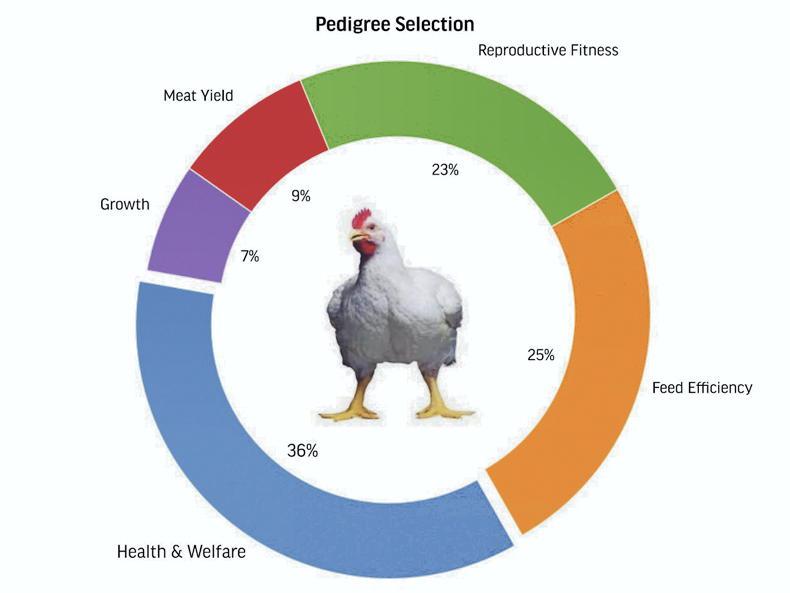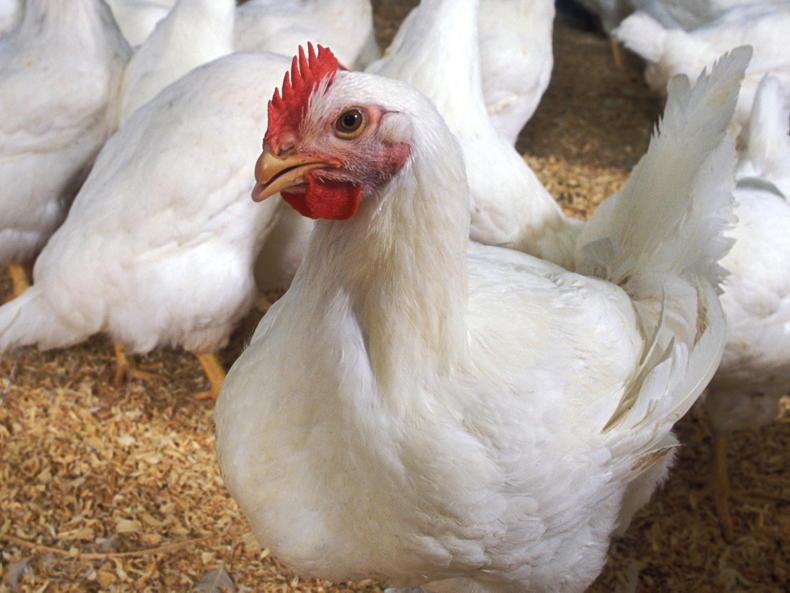Ireland produces and consumes 110 million chickens per year.
The broiler industry has only existed for around 100 years, yet the innovation and precision that has driven its growth demonstrates what can be achieved with improved welfare and genetics.
Globally, chicken is the second-largest meat protein after fish. It is a widely available, lean, nutritious source of protein.
It is consumed in most cultures and is a versatile ingredient that is simple and quick to cook. This is achieved in tandem with unparalleled sustainability and efficiency.
The foundations of the success of the chicken industry are the same as any livestock farming enterprise.
A farmer with good attention to detail and a love of his stock will be a good farmer, no matter what the species. Margins are tight in chicken farming, so only the farmers with these traits remain farming for long.

The four pillars on which the modern chicken industry is built are: Genetics, Nutrition, Housing and Husbandry, Biosecurity and Vaccination.
Improved Genetics
Genetic improvement from selected pedigree birds to commercial broilers is achieved after only five years.
From one pedigree male and 10 females, 50 million broilers can be produced after four generations.
Pedigree selection is not this powerful in any other species, with the benefits of genetic improvement and hybrid vigour amplified through the generations.
Contrary to what many lobby groups might suggest, the main genetic drivers are not growth rate or meat yield, but health, welfare and feed efficiency.
Selection for health and welfare is paramount. This means the welfare of broiler chickens, their robustness, and their ability to deal with any challenges which come their way will not be compromised under standard growing conditions.
Feed efficiency remains a priority and leads to all important sustainability gains in a world with finite resources.
Growth is a low priority. The industry is happy with current growth rates and crop lengths. Ease of farming with higher welfare for farmers and birds is more important.
On-farm precision
Poultry nutrition is a very exacting science. Although chickens are naturally omnivorous, European poultry diets come exclusively from vegetable sources.
High emphasis is placed on gut health and absorption to utilise the entire ration. This improves efficiency, but also reduces waste and minimises nitrogen and phosphorus emissions.
According to Aviagen, the dominant pedigree breeding company in Europe, their Ross 308 broiler has a 50% lower carbon footprint than the birds of the 1970s, and it is expected that by 2030, there will be a further 15% reduction due to improved feed conversion.
According to Diarmaid Kirby of Western Brand, Ireland’s largest family-owned poultry company, housing and husbandry standards are very high in the commercial chicken sector.
“All our houses are visited by Bord Bia-trained field officers before birds are placed, to ensure the environment is appropriate. Because we have an integrated supply chain, we can make sure that all inputs are of a high standard and our farmers are fully supported throughout.
"By matching production with market demands, we help to ensure profitability and motivation remains high on our poultry farms,” he explains.
Biosecurity and vaccination minimise the risk of disease to flocks of all sizes.
Indoor broiler units are biosecure enterprises. Farms operate on an all-in/all-out basis, with full cleaning and disinfection between production cycles.
Visitors to the sites are kept at a minimum and must also adhere to biosecurity protocols.
Irrespective of biosecurity, vaccination is still essential to prevent disease outbreaks. Mass vaccination can be administered in the hatchery and it is not unusual for birds to be vaccinated for five different diseases before they arrive to the farm.
Quality of vaccine administration is well-controlled in the hatchery and these birds have long-lasting immunity to the pathogens they are most likely to encounter.
As a result of both biosecurity and vaccination, antibiotic use in poultry is almost negligible.
MSD Animal Health supports all the main chicken companies in Ireland to ensure appropriate vaccination and guarantee the welfare of the birds.
The impact of many poultry diseases is subclinical, resulting in poor weight gain and overall performance. In these situations, effective vaccination improves feed conversion efficiency and reduces amount of feed needed to reach market weight.
As such, vaccine companies can also be considered a Sustainability Partner, as well as an Animal Health Partner.
One unfortunate consequence of the excellent biosecurity of poultry farms is that nobody gets in to see the high standards therein and there is a disconnect between the consumer and the chicken farmer.
The image of the backyard chicken can be more wholesome than a large commercial unit, but the shared values at both ends of the scale, and the resources on commercial farms, ensure chickens are farmed sustainably, responsibly, and ethically on even the largest farms.
More Information
MSD Animal Health, Red Oak North, South County Business Park, Leopardstown, Dublin 18, Ireland.
MSD Animal Health can be contacted at 01-297-0220 or emailed at vet-support.ie@msd.com. You can visit their website at www.msd-animal-health.ie.







 This is a subscriber-only article
This is a subscriber-only article




